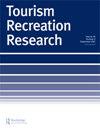宗教、灵性与旅游知识的形成
IF 2.6
Q1 HOSPITALITY, LEISURE, SPORT & TOURISM
引用次数: 3
摘要
在过去的十年中,旅游学术界越来越多地被描述为在社会学框架下的知识领域工作。然而,到目前为止,文献中还没有明确考虑到学者的精神和/或宗教信仰是否以及如何影响他们对知识形成的参与。借鉴Barkathunnisha等人发表在《旅游时事》上的文章《迈向旅游高等教育的灵性平台》,提出了基于灵性和基本四大支柱的第7个旅游知识平台的概念——一种认识的精神;做事精神:做事的精神;精神:存在的精神;这篇探索性的论文将试图提出一些初步的想法,关于灵性和宗教信仰可能给旅游学术界带来的一些挑战和机遇。根据作者自己的基督教信仰的自传式见解,本文最后讨论了旅游学院将不得不面对的问题,以便找到将这种精神/宗教观点纳入旅游知识制定的方法。本文章由计算机程序翻译,如有差异,请以英文原文为准。
Religion, spirituality, and the formation of tourism knowledge
ABSTRACT Over the last decade, tourism academia has been increasingly characterised as working in a knowledge domain that is sociologically framed. To date, however, there has been no explicit consideration in the literature as to whether and how an academic’s spiritual and/ or religious beliefs should influence their engagement with knowledge formation. Drawing on Barkathunnisha et al.’s article “Towards a spirituality-based platform in tourism higher education” published in Current Issues in Tourism that proposed the notion of the 7th platform of tourism knowledge based on spirituality and the underlying four pillars – a spirit of knowing; a spirit of doing; a spirit of being; and a spirit of becoming – this exploratory paper will seek to propose some preliminary thoughts on some of the challenges and opportunities that a belief in spirituality and religion might have for tourism academia. Drawing on autobiographical insights from the author’s own Christian faith, the paper concludes by discussing issues that the tourism academy will have to face in order to find ways to bring such a spiritual/ religious perspective into the formulation of tourism knowledge .
求助全文
通过发布文献求助,成功后即可免费获取论文全文。
去求助
来源期刊

Tourism Recreation Research
HOSPITALITY, LEISURE, SPORT & TOURISM-
CiteScore
11.30
自引率
7.10%
发文量
77
期刊介绍:
Tourism Recreation Research is a multidisciplinary international journal now published quarterly; it focuses on research problems in various tourism and recreational environments — ecological, economic, and socio-cultural — and attempts to seek solutions for sustainable development. Contributions are also encouraged on fundamental research concepts and theories. The journal carries regular features such as Research Note, Post-Published Reviews and Book Reviews. The ‘Research Note’ provides opportunity for scholars who have attained sufficient maturity to establish reliable findings in their field of research. The ‘Post-Published Review’ section has been introduced to capture deep insights into the papers that have already been published in Tourism Recreation Research to fill in gaps in the received information. Strong emphasis is laid on original research and readable prose.
 求助内容:
求助内容: 应助结果提醒方式:
应助结果提醒方式:


